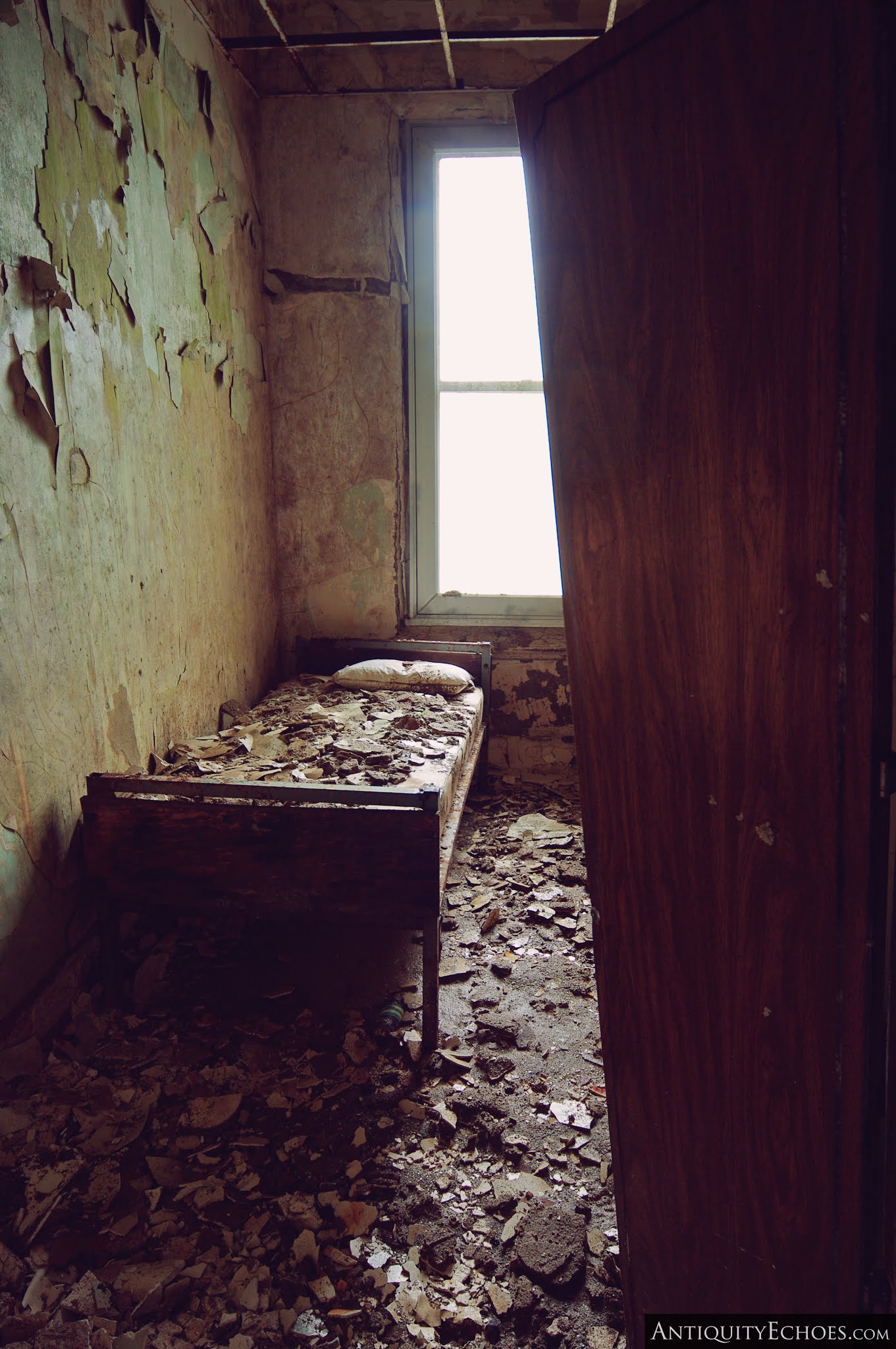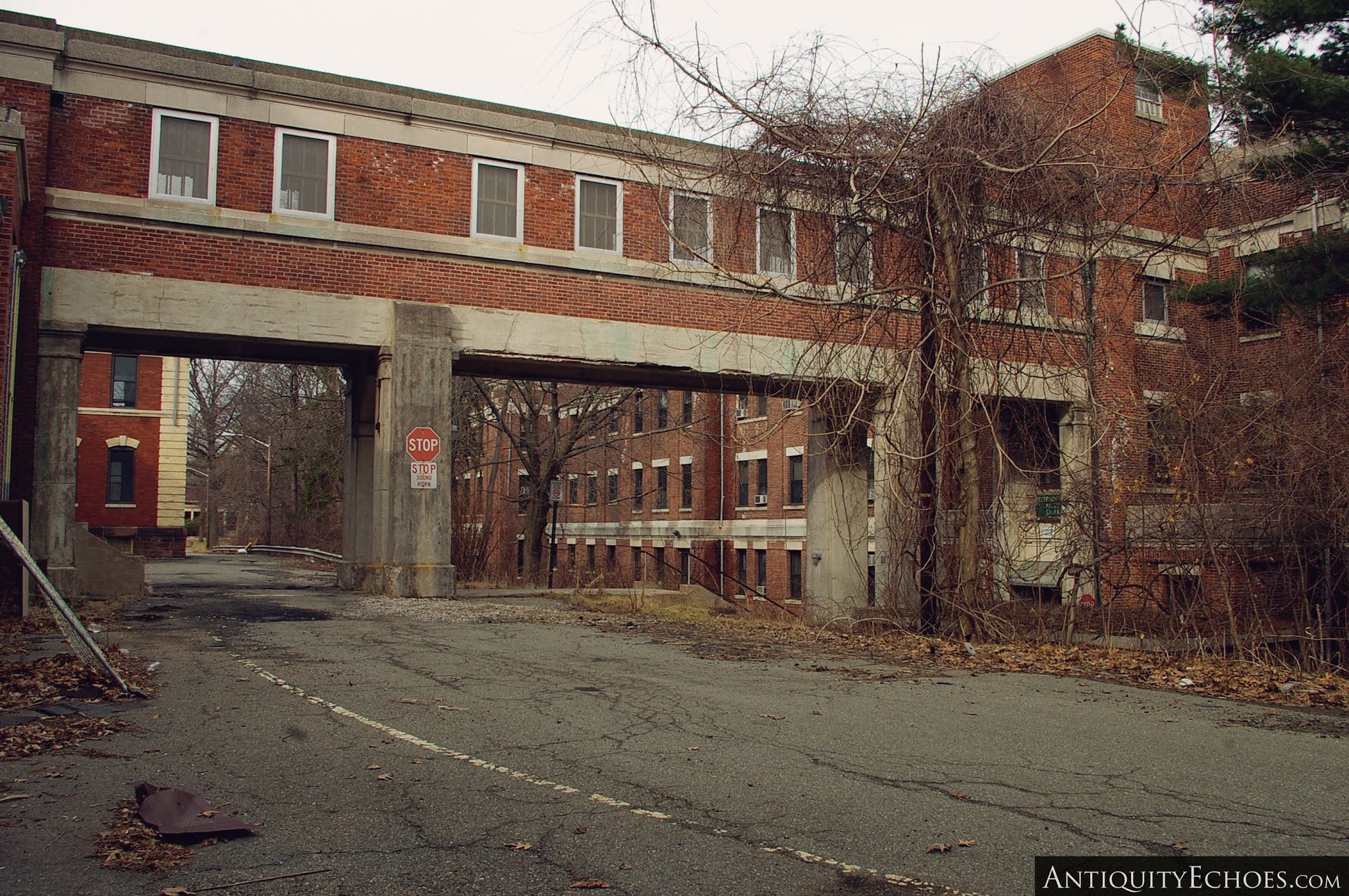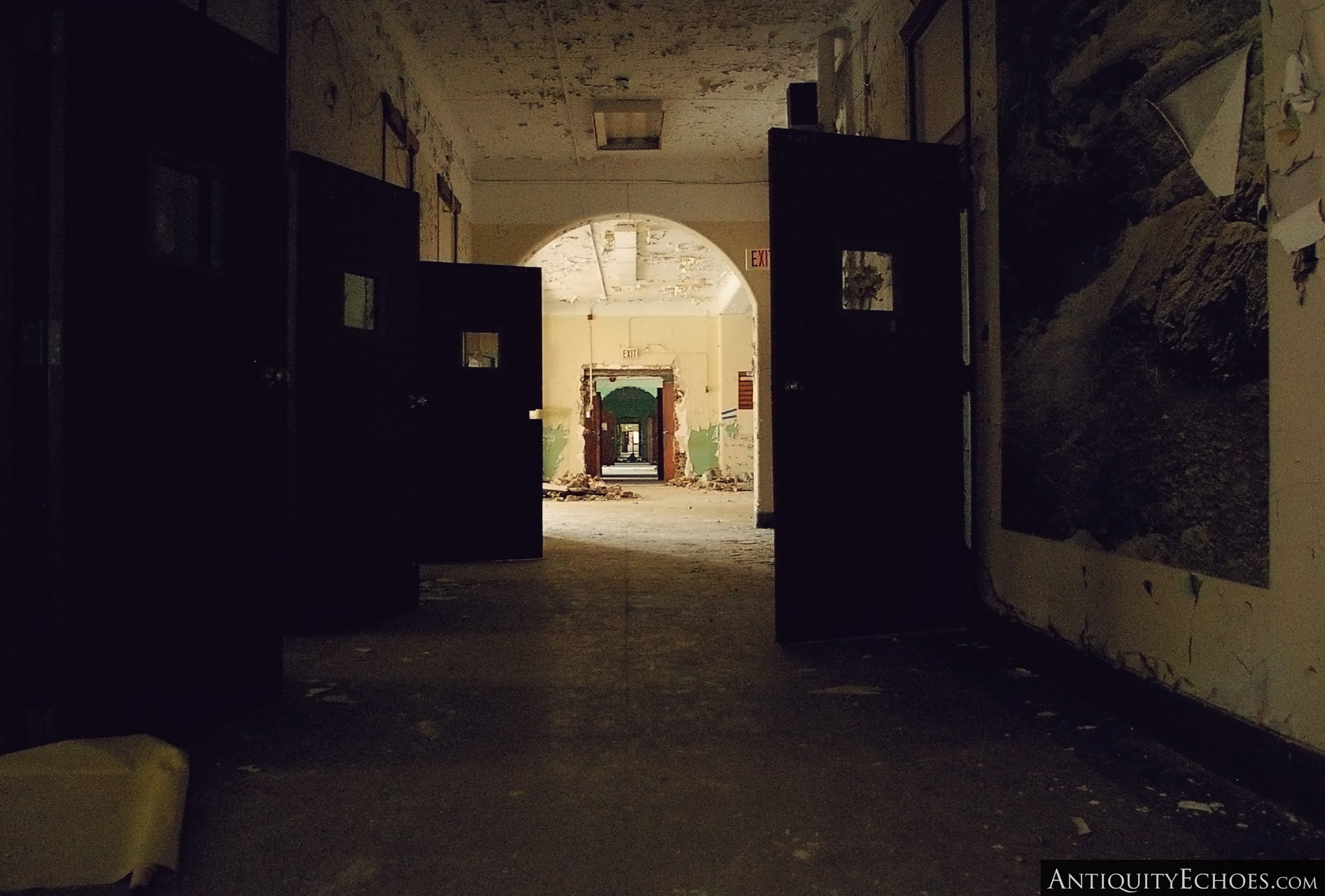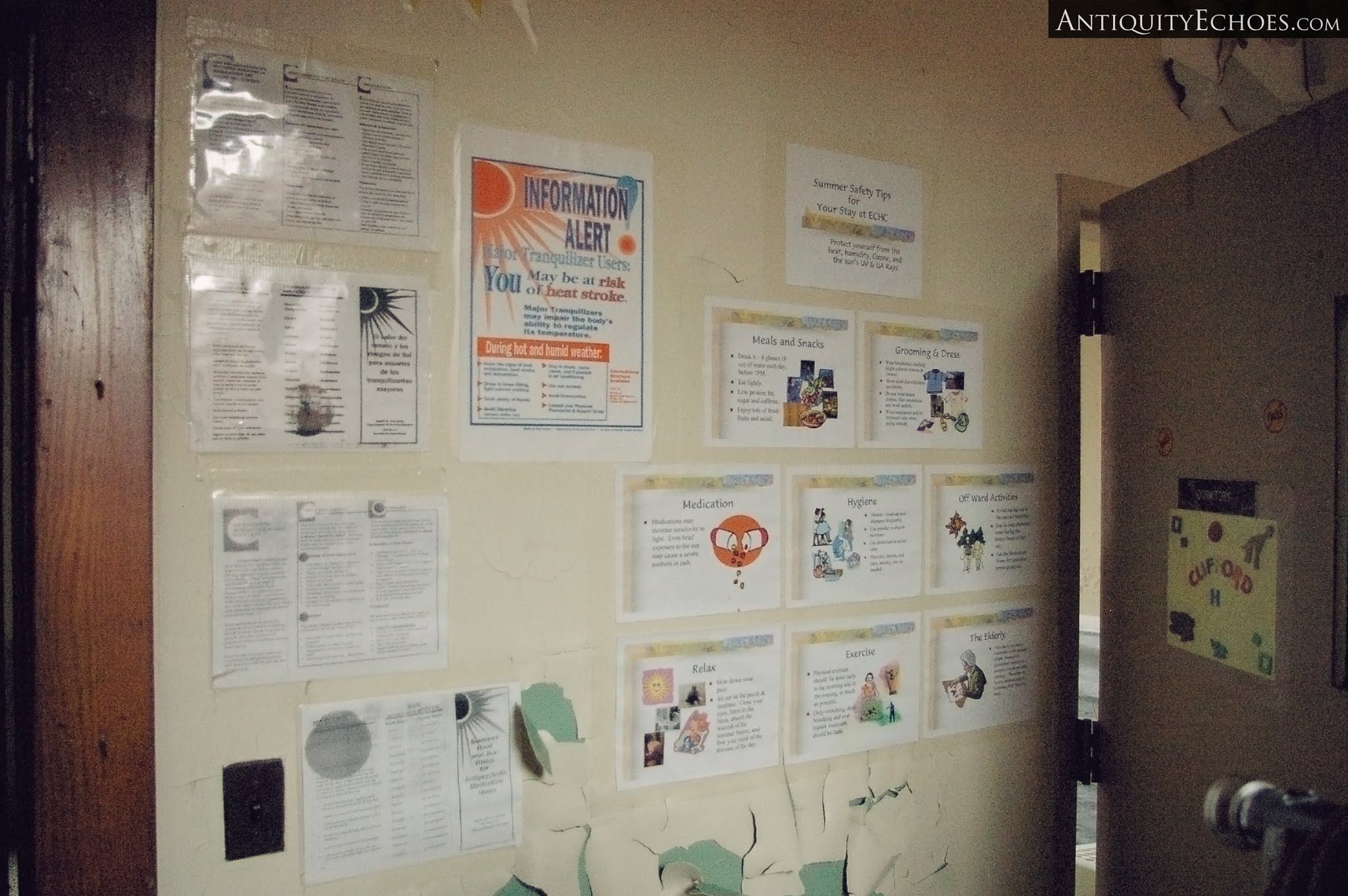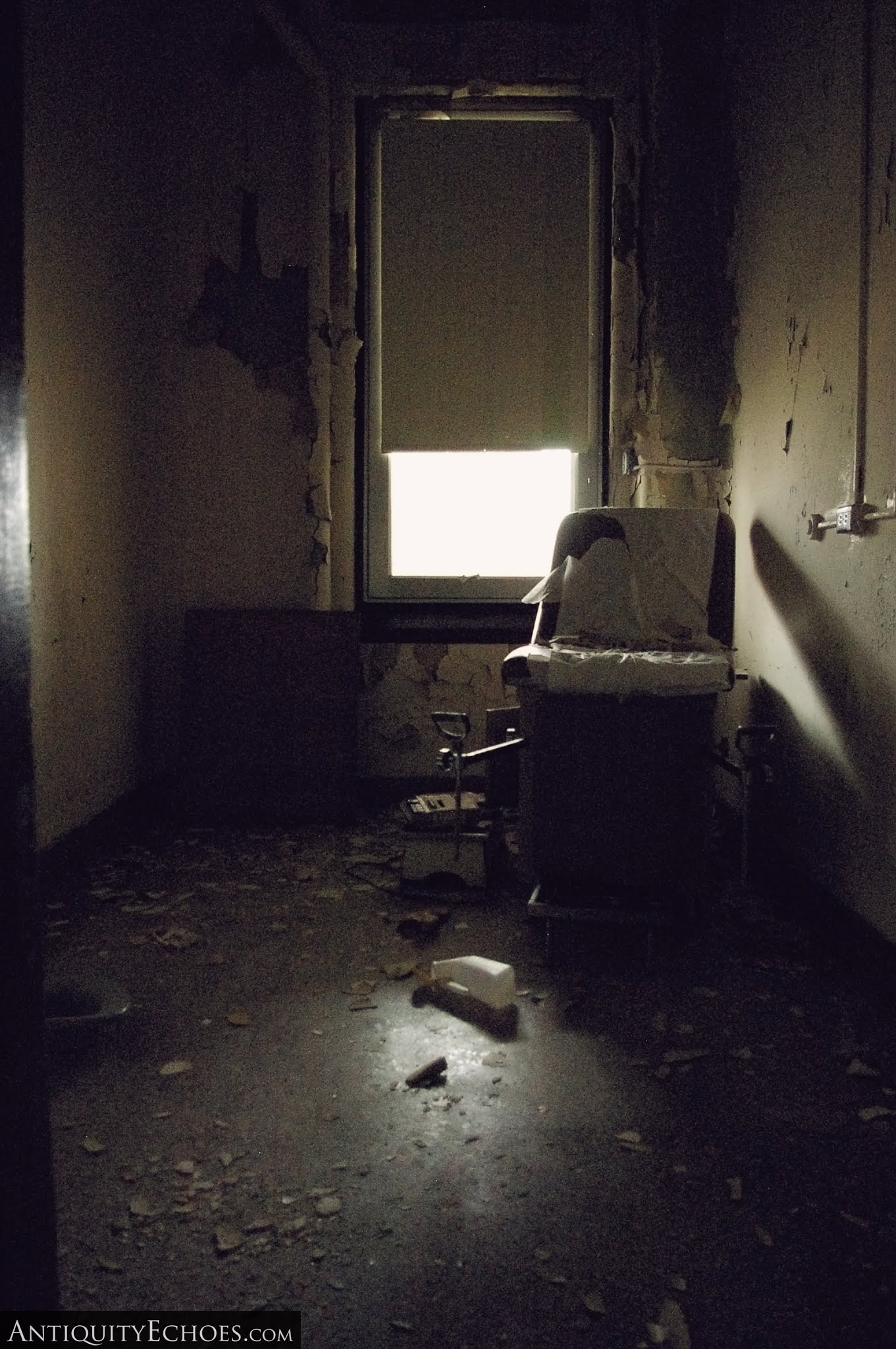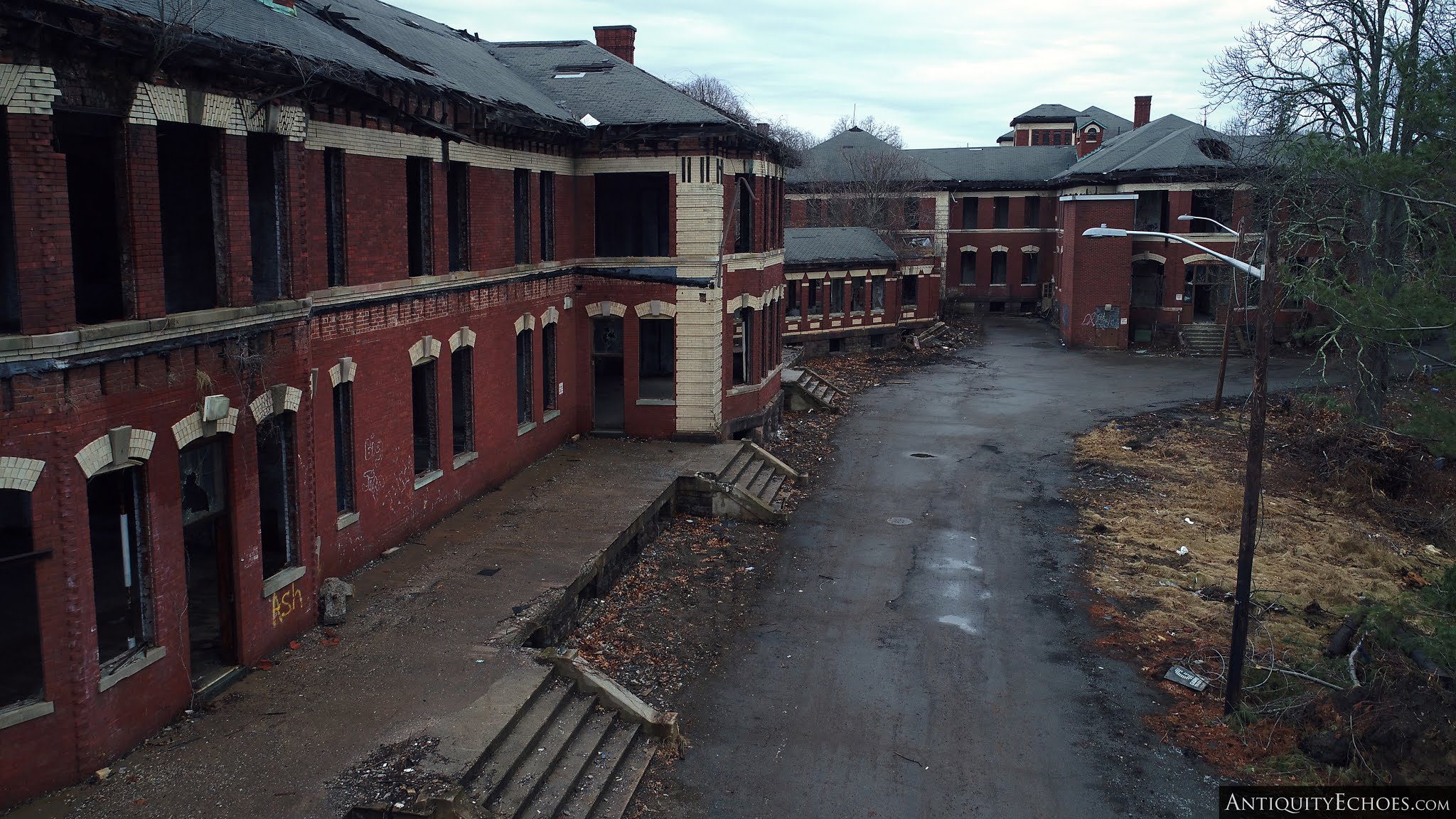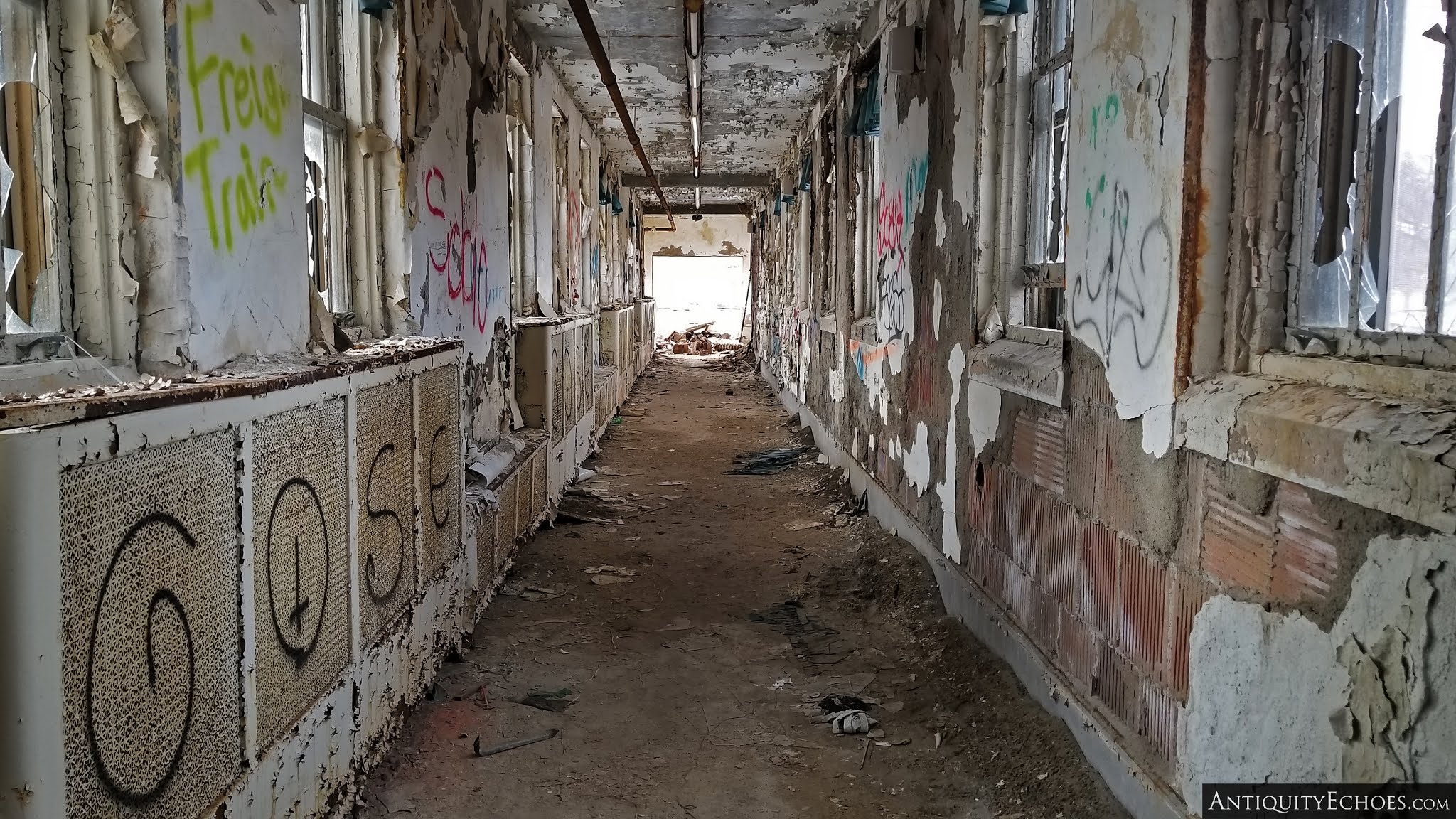Chronicle of the Overbrook Asylum (aka The Essex County Hospital Center)
This former psychiatric hospital is a
place we hold dear to our hearts – In fact, it was these very walls
which inspired us to begin this website in the first place. With this entry we hope to pen a memorial to a place that meant
countless different things to countless different people. There is no
way to encapsulate or define what Overbrook was, but to say we were
changed by it would be an understatement, and in many ways we will always carry the old hospital
with us. What follows is a chronicle of sorts, split into nine
separate parts, and spanning the years 2009 to 2019.
Our own history with the asylum began
in early 2009. We were driving through Essex County, New Jersey and
by pure happenstance ended up traveling directly past a massive
sprawling complex of buildings. It seemed to go on forever,
encompassing both sides of the roadway. Our first impressions were
that the facility was long abandoned, so we immediately turned around
to investigate the place closer. Finding a pot-hole covered access
road we made our way to the inner campus and parked away from the
eyes of passing motorists. With little effort, we came upon an open
door and crossed the threshold.
Greeting us in the day-room which we had entered was a scene from some night terror come to life. In a dim corner, perched upon a dry-rotted vinyl chair caked with dust and flakes of peeled paint, sat a headless body. The fight-or-flight urge was immediate. Yet, we were able to overcome it, and quickly the feelings of shock and dread subsided. Closer investigation revealed the headless form to be an old CPR dummy, its faceless head lay upon on the floor next to it.
Greeting us in the day-room which we had entered was a scene from some night terror come to life. In a dim corner, perched upon a dry-rotted vinyl chair caked with dust and flakes of peeled paint, sat a headless body. The fight-or-flight urge was immediate. Yet, we were able to overcome it, and quickly the feelings of shock and dread subsided. Closer investigation revealed the headless form to be an old CPR dummy, its faceless head lay upon on the floor next to it.
As we ventured beyond that eerie dayroom, we were in awe of what we found - The place was clearly some kind of hospital, that much was made obvious by the countless beds, large common-rooms, and various offices. The deteriorating hallways stretched on for what seemed like forever in all directions. We knew precious little about what we were seeing before us, but regardless it pulsed with a significance we had not yet experienced. We decided to film.
It was here that we took our first, admittedly shaky, steps toward documenting a place with purpose. Not only were we without a tripod for our camera, which was just 6 megapixels at the time, this was also our very first foray into the realm of video. In our initial time upon that campus we simply captured what we could, however we could.
 Upon returning home we immediately
began conducting research to better understand what it was that we
just saw. It turned out that the place was indeed a hospital, but not
in the way we had assumed. What we spent the afternoon exploring was
the decaying husk of the 'Essex County Hospital Center', or if you
were to call it by its original title – the 'Overbrook Asylum'. At
this point we came to two startling realizations – First, though
the places we had filmed up until that point did indeed carry their
own tales and historical weight, it wasn't until Overbrook that we
had ever seen a place that had affected so many people over such a
long period of time. The scale and scope of its reach through the
years was difficult to grasp at first. The amount of history found in
just a single ward of Overbrook was deeper than any of the places we
had documented up until this point. The second realization came after
some more in-depth investigation into the old hospital center - In
researching the history of the facility we were able to gather
together a timeline as well as begin to see just how massive of a
facility this place once was.
Upon returning home we immediately
began conducting research to better understand what it was that we
just saw. It turned out that the place was indeed a hospital, but not
in the way we had assumed. What we spent the afternoon exploring was
the decaying husk of the 'Essex County Hospital Center', or if you
were to call it by its original title – the 'Overbrook Asylum'. At
this point we came to two startling realizations – First, though
the places we had filmed up until that point did indeed carry their
own tales and historical weight, it wasn't until Overbrook that we
had ever seen a place that had affected so many people over such a
long period of time. The scale and scope of its reach through the
years was difficult to grasp at first. The amount of history found in
just a single ward of Overbrook was deeper than any of the places we
had documented up until this point. The second realization came after
some more in-depth investigation into the old hospital center - In
researching the history of the facility we were able to gather
together a timeline as well as begin to see just how massive of a
facility this place once was. This floodgate of information also taught us much about the evolution of psychiatric medicine, both in practice and in pharmaceutical development, which eventually led to deinstitutionalization on a national level. All of this newly found knowledge was spring-boarded by the most unlikely of things - An abandoned asylum on the side of the road. One which many people likely ignored as they drove past on a daily basis.
To think
upon the countless tales hidden in those walls, and how all of them
were completely unknown to us until we stumbled upon the old hospital, put a lot into perspective for us. If we had to
pinpoint one singular moment that came to define our work, it would
be that very moment of realization. How many great stories have been
lost beyond the grime and dust, left to fade away into the void of
time? For all we remember, how much have we forgotten? Even in the deepest silence of the most
deserted of places, antiquity is all around you, omnipresent, echoing
outward infinitely. Whether you choose to listen for it or
not is inconsequential, as it persists nonetheless.
Entering this place it feels less a
hospital complex, and more a winding labyrinth of dirty red brick and
chipping mortar. The sheer scale of the grounds is difficult to
communicate in text or photo. One's imagination suggests the sense of
having left the familiar world behind for something altogether
separate, and in many ways you have. Serpentine lengths of brick
adorned with copper flashing and ornate dormer windows expand outward
for what seems to be forever in all directions. Every angle of the
corridor reveals another bend, or stairwell, or row of doorways, and
every room has a story to tell. Overbrook is more than just a
discarded shell or out-dated facility - It is a testament to the
massive strides in healthcare and basic human rights made during
recent decades, and a crumbling monument to those who toiled,
suffered and died before they became a reality.
Overbrook opened in 1896, and was built in many ways to be Essex County's local answer to the neighboring Greystone Park Psychiatric Hospital which once stood in Parsippany, New Jersey. Its purpose was to house and care for the mentally, and in some cases physically, handicapped residents of the county. Once completed the campus had over a dozen buildings on its 90 acres, most of them connected via miles of subterranean tunnels running under the grounds.
The hospital operated for over a century, and there were no shortage of hardships faced during that time. One of the most infamous events occurred in the winter of 1917, when the asylum's boiler broke down leaving the inhabitant's without heat for twenty days. During that span, twenty-four people lost their lives to the cold, many freezing to death in their beds. Also, like many such institutions of the day, during the great depression large numbers of homeless found refuge here, but over-crowding and heavily rationed food made living conditions very poor. Following World War II there was also a large influx of patients suffering from 'shell shock' and post-traumatic stress, issues which the overburdened facility was hard-pressed to properly treat. Accounts of neglect, starvation, escapes, and suicides were reported. All told, over ten thousand people died while confined within Overbrook's walls.
Overbrook opened in 1896, and was built in many ways to be Essex County's local answer to the neighboring Greystone Park Psychiatric Hospital which once stood in Parsippany, New Jersey. Its purpose was to house and care for the mentally, and in some cases physically, handicapped residents of the county. Once completed the campus had over a dozen buildings on its 90 acres, most of them connected via miles of subterranean tunnels running under the grounds.
The hospital operated for over a century, and there were no shortage of hardships faced during that time. One of the most infamous events occurred in the winter of 1917, when the asylum's boiler broke down leaving the inhabitant's without heat for twenty days. During that span, twenty-four people lost their lives to the cold, many freezing to death in their beds. Also, like many such institutions of the day, during the great depression large numbers of homeless found refuge here, but over-crowding and heavily rationed food made living conditions very poor. Following World War II there was also a large influx of patients suffering from 'shell shock' and post-traumatic stress, issues which the overburdened facility was hard-pressed to properly treat. Accounts of neglect, starvation, escapes, and suicides were reported. All told, over ten thousand people died while confined within Overbrook's walls.
 In the first half of the 20th Century,
mental illness was still relatively poorly understood. Because of that,
Overbrook was host to numerous forms of attempted treatment that
today would widely be considered outdated, and some even as forms of
torture. A particular specialization at Overbrook was the relatively
tame discipline of hydrotherapy, also known as hydropathy or water
cures. However, electrotherapy and even prefrontal lobotomies were
also performed here. A growing interest in psychiatric medicine
during the 1950s and 1960s brought with it tremendous strides in
research and the development of new treatments. The advent of
psychotropic drugs, combined with the growing stigma toward large
institutions such as Overbook, saw the number of patients living at
the hospital steadily declining. By the time it closed in 2007, the
hospital was operating out of a small wing of a single building,
while the rest of the complex was left to weather and crumble around
it. Eventually, its role was subsumed into the nearby, newly-erected
Essex County Hospital Center just down the road, and the doors were
locked for good.
In the first half of the 20th Century,
mental illness was still relatively poorly understood. Because of that,
Overbrook was host to numerous forms of attempted treatment that
today would widely be considered outdated, and some even as forms of
torture. A particular specialization at Overbrook was the relatively
tame discipline of hydrotherapy, also known as hydropathy or water
cures. However, electrotherapy and even prefrontal lobotomies were
also performed here. A growing interest in psychiatric medicine
during the 1950s and 1960s brought with it tremendous strides in
research and the development of new treatments. The advent of
psychotropic drugs, combined with the growing stigma toward large
institutions such as Overbook, saw the number of patients living at
the hospital steadily declining. By the time it closed in 2007, the
hospital was operating out of a small wing of a single building,
while the rest of the complex was left to weather and crumble around
it. Eventually, its role was subsumed into the nearby, newly-erected
Essex County Hospital Center just down the road, and the doors were
locked for good.The deep and sordid history of the adylum invisibly rippled throughout the grounds, and had shaped the Overbrook property into a shadowy place. The air hung heavy in the halls, and a constant feeling of remorse was impossible to escape when you know what has transpired here long before you yourself stood in its presence. The heavy state of decay here seems almost suiting, as if the building were finally able to reflect visually what it has held inside all these decades. Black rotten masses of sheet-rock hung upon the walls, impossibly deep shadows concealed corners of wards, and fallen paint chips covered the floor so profusely that at times you simply could not tell what the tiles below even looked like.
In the end, though, we would like to
think that Overbrook had come to find its own version of peace. No
longer was it home to any pain or suffering. No longer was it a sight
that brought fear to those who gazed upon it. No longer were the
early morning hours broken with cries or screaming. Now the mornings
are silent, save for the early-rising songbirds who chirp as
slow-moving mists crawl across the dew covered grounds. Maybe, below
what onlookers saw as a ruinous blight, Overbrook was at rest.

*Image courtesy of Philip Edward Jaeger
Lifeless, but astir all the same.
Patient beds left behind in what were initially day-rooms show how bad overcrowding had become at the hospital.
The basement of the asylum was loaded
with rotting paperwork, not just from this hospital center, but also
from the long-gone mountaintop sanitarium which once stood high above
on the adjacent property. The following three images were taken with a cellphone illuminated by flashlight. While not of the greatest quality, they do give a good understanding to the sheer volume of records that were stored away and abandoned to rot.
The more time you spend in a place like Overbrook, the more you come to realize that the boundary between life and death is very much a human creation.
The cafeteria ceiling, collapsed, exposing the original roofing and skylights.
This paper was found strewn upon the floor of a ward corridor.T Thougheasily overlooked, its text provides a profound look into daily life at the asylum, and helps lend a human connection to halls which had been devoid of life for many years.
In many instances patient names still remained upon the foot boards of beds.
Before this website came into being, 'Antiquity Echoes' actually existed as a Myspace blog. Unfortunately, the old Myspace has been wiped from existence, scrubbed from servers, and lost to a mostly-forgotten era shared by AOL Instant Messaging, Limewire music downloading, and dial-up internet access.
What follows is a re-hosting of our original Overbrook images from 2009, which were a part of the very first 'Antiquity Echoes' blog post on Myspace. Though they may be grainy, crooked, and perhaps a bit strangely composed, they represent our very first work driven by a genuine passion, and with a clarity of vision which the old asylum had imparted upon us. These are our roots.
Our very first photograph of Overbrook, taken upon exiting our car.
A ward dayroom as it would have appeared in the early 1900s.
*Image courtesy of Philip Edward Jaeger
Caged stairwells like this are a precautionary measure against patient suicide.
A basement fallout shelter, emptied and moldering.
Bits and pieces of the CPR dummy could be found throughout the hospital for years.
We actually became lost for a time within the hospital, losing our bearings as a thick fog rolled in.
As
the years went on Overbrook became more and more a victim of
vandalism than of natural decay. For several years early on though,
when the campus still stood in its entirety upon both sides of
Fairview Avenue, the buildings existed in decent repair. Perhaps the
most profound thing we have come to notice when looking back at a
full decade of photographs from this location is how peaceful and
almost welcomed natural decay is when it's slowing returning a
building to the earth. Human destruction, on the other hand, always
radiates bitterness and contempt, things thankfully not present in
the natural world.
Staff Nurses' Home. A basement tunnel connected this structure to the asylum proper.
*Image courtesy of Philip Edward Jaeger
A small physicians village stood across Fairview Avenue, where doctors and their families once called home.
The admin building as it appeared in 1909.
*Image courtesy of Philip Edward Jaeger
Remnants of a playground, overgrown in the hospital lawn.
This building (tailor shop and laundry) was leveled years before the demolition of the hospital wards.
Hospital chairs always dotted the campus roadways.
The old coal plant.
*Image courtesy of Philip Edward Jaeger
The idea of
venturing to an abandoned asylum at night likely recalls nothing so
much as the opening scene of a horror film. In truth though, aging
mental hospitals like Overbrook have a certain natural affinity for
quiet and the dark. At night the old wards seemed filled not by
apparitions, but by a serene silence. It was as if the weathered
campus welcomed the chance to hide from its painful past under a
blanket of black and simply exist, away from the world with only the
stars for company.
The
snow was iced over, making our hike across the campus difficult at
times. What began as a light snow slowly changed to sleet, and then
ceased altogether as a thick fog slowly came to blanket the asylum
campus. Though we were only able to spend a few hours on the grounds
this day, they are among our fondest memories of the hospital center.
The serene beauty of Overbrook in winter was an experience unlike anything else.
The end came
slowly for Overbrook, with demolition beginning in 2016 and ongoing
for two years thereafter. Seeing the walls which taught us so much
reduced to rubble and fill was heartbreaking in a way that we cannot
possibly formulate into words. It wasn't just us who Overbrook awoke
something within either, throughout the years we've been documenting
abandoned locations we have crossed paths with many people who,
themselves, were greatly influenced by the old hospital center.
Wheeler Antabanez, Abandoned NJ, and Vancant New Jersey are just a few of the countless names and people
who found inspiration, or experienced a moment of clarity, beyond
those walls.
Up until just prior to demolition, this brick form held metal signage which read 'Essex County Hospital Center'.
All manner of debris, from cabinets to wall sections, heaved out the admin windows for removal.
The beginning of the end - Building 5, pictured, was the first portion of the main hospital to be completely razed.
Familiar sights slowly became unfamiliar.
The sky-way, now leading to annihilation.
Just weeks from the complete razing of
the campus we took one last walk through the grounds, accompanied by
Kevin of Abandoned NJ. The sole structure that remained was building
11, a more modern structure built behind the old asylum wards,
connected by a sky-way that became an iconic part of the grounds. Now
that sky-way led to nothing, save for a drop onto rubble at the
center of a muddy field where once a massive campus stood. This trip
was an unplanned one, so all we had available to shoot with was a
cellphone. Still, perhaps the rawness of these cellphone photos do a
better job conveying the melancholy of that day than a more polished
set of images could have. In many ways they remind us of the grainy
old photos from our initial visit in 2009.
View from the sky-way, looking toward the newly-constructed Essex County Community Center.
The snow-covered roof of building 11.
This old ward chair sat far off in the wood-line, our last sight as we hiked back to our cars.
A cold wind blows.
The Overbrook grounds today show no
indication that the hospital center ever existed, let alone claimed
this knoll for over a century. Gone is the red brick and copper,
replaced by plywood and vinyl. At one time a massive psychiatric
center sprawled its wings here, now hundreds of townhouses do the same.
Where some see loss, others see progress. Either way we must ask
ourselves - Are we better or worse off for it?
Just beyond the new construction the rubble of Overbrook was still being cleared from the land.
The original firehouse is the lone holdout of the old asylum, it stands among the new housing, a relic of the past with an uncertain future.
A cold wind blows.


















